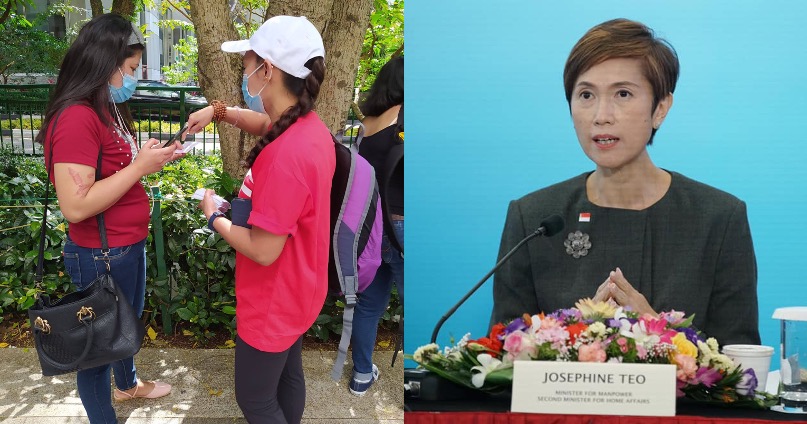Minister of Manpower Josephine Teo extended her deepest condolences to the family of Piang Ngaih Don, the Myanmar foreign domestic worker who was assaulted to death while working in Singapore.
Before her death in July 2016, Piang was repeatedly physically abused by her Singaporean employer, Gaiyathiri Murugayan.
Among other abuses, Gaiyathiri kicked and slapped her helper, poured cold water on her, gave her bread soaked in water to eat, forced her to sleep for just five hours every night, and forced her to perform chores while wearing multiple layers of face masks as her employer found the helper "unhygienic".
At the time of her death, the 24-year-old mother of a three-year-old boy back home weighed just 24kg.
Sentencing has been adjourned to a later date as the judge considers the case.
Helper's suffering and death should never have happened: Josephine Teo
In a Facebook post on Feb. 24, Teo said that the government takes the protection of foreign domestic workers "seriously", and will let the law run its course.
Teo called the case "appalling", and added:
"The suffering and death of Ms Piang should never have happened. Abuse is abhorrent, whoever the victims are. When it involves FDWs, all the more we have to act."
Safeguards will be reviewed and measures to detect abuse improved
Teo said that the Ministry of Manpower will continue its review even as the case is ongoing:
"As a community of support to foreign domestic workers, we have to do better. Even as the case is tried in court, Singapore Ministry of Manpower’s review will continue.
These would include the threshold for blacklisting errant employers, as well as improving measures to detect abuse."
There are multiple existing "safeguards" and a settling-in period of six months for first-time workers, Teo said, which lets them know points of contact should they need help.
These include:
- The MOM hotline
- Non-government organisations (NGOs) like the Centre for Domestic Employees (CDE) and Foreign Domestic Worker Association for Social Support and Training (FAST)
- Employers attend an orientation programme where they are educated on their roles and responsibilities
MOM also works with an "extensive network" of NGOs who engage with and look out for the workers.
But Teo noted that Piang attended the settling-in programme and was spoken to by her employment agency on two separate occasions.
She also noted that Piang had been examined by doctors on at least two occasions between six and 10 months of her employment.
"Sadly, on none of these occasions were signs of her distress picked up," Teo said.
Proactive action could help
Teo also appealed to the public to help by reaching out to CDE or FAST if they notice any instances of ill-treatment of foreign domestic workers.
MOM's hotline is 1800 339 5505 to get in touch with an officer.
In a statement also on Feb. 24, the Humanitarian Organization for Migration Economics called the abuse that Piang suffered "horrific, dehumanising and abhorrent."
The organisation also hoped that medical professionals would act proactively if they encounter domestic and migrant workers showing signs of abuse.
This could involve history-taking independent of employers and flagging such abuses to the authorities or organisations that assist migrant workers.
Top image from CDE and Josephine Teo's Facebook pages.If you like what you read, follow us on Facebook, Instagram, Twitter and Telegram to get the latest updates.

